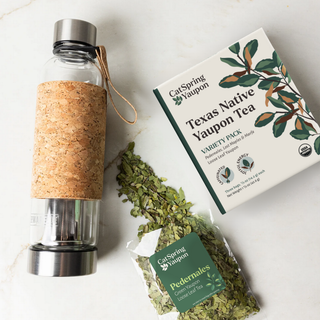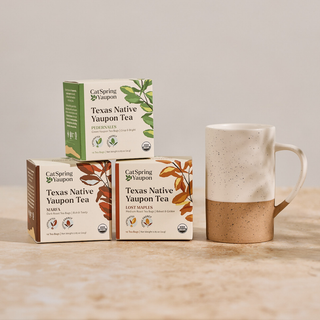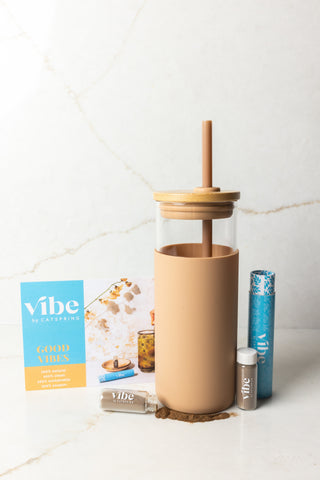Wondering which teas may support a heart-conscious lifestyle? High blood pressure—also known as hypertension—often develops silently, with few clear signs or symptoms.
While no tea cures high blood pressure, certain herbal teas are known for their calming, purifying, or circulatory-supportive qualities. This guide explores seven of the best teas for high blood pressure, including native yaupon holly (Ilex vomitoria)—a smooth, naturally purifying herbal tea long rooted in North America.
1. Yaupon Tea (Yaupon Holly • Ilex vomitoria)

Yaupon tea is a naturally caffeinated herbal tea and unlike other teas, yaupon is naturally smooth, never bitter, and gentle on the stomach. Traditionally used as a purifying herbal tea, yaupon supports clarity, steady energy, and calm focus—qualities that align well with a heart-conscious lifestyle.
Why yaupon appears on this list:
-
Smooth, “joyful” caffeine without jitters
-
Rich in antioxidants that support overall wellness
-
Easy on digestion; never bitter
-
Grown sustainably and wild-harvested
Yaupon offers a grounded, steady energy that fits well into routines focused on relaxation and balance.
2. Green Tea

Green tea is one of the most researched teas for overall cardiovascular wellness. Its catechins—especially EGCG—are often studied for their role in supporting healthy blood vessel function.
Why it’s included:
-
Rich in antioxidants that support circulation
-
Mild caffeine that supports alertness without overstimulation
-
Traditionally used in many heart-conscious diets
3. Hibiscus Tea

Hibiscus tea is among the most commonly recommended teas for supporting healthy blood pressure. Research suggests that hibiscus tea may support lower systolic and diastolic numbers in people with mild hypertension. Its bold ruby color and tart flavor make it both delicious and functional.
Why hibiscus tea is highly recommended:
-
Often labeled “anti-high blood pressure tea” in natural wellness circles
-
Naturally purifying
-
Antioxidants may support vascular relaxation
4. Ginger Tea

Ginger tea offers warmth, comfort, and circulatory support—important factors when discussing what causes high blood pressure. While not a direct hypertension tea, ginger is widely used to help relieve tension and support healthy blood flow.
Helpful qualities:
-
Supports circulation
-
Naturally warming and soothing
-
Easy to blend with hibiscus, chamomile, or yaupon
5. Roasted Oolong Tea

Roasted oolong sits between green and black tea, with a smooth, toasty profile. The polyphenols found in oolong are often linked to heart health, metabolism, and general cardiovascular support.
Why some choose it:
-
Contains beneficial polyphenols
-
Gentle caffeine similar to green tea
-
Rich, roasted flavor makes it a comforting daily tea
6. Lavender Tea

Lavender tea is traditionally used for calming the nervous system—useful because stress is a major contributor to hypertension high blood pressure. By supporting relaxation, lavender tea can indirectly support a heart-conscious lifestyle.
Why lavender is included:
-
Supports relaxation and calm
-
Helps unwind after stressful days
-
Complements chamomile and yaupon beautifully
7. Chamomile Tea

Chamomile tea is one of the gentlest herbal teas and is often used to support rest and stress reduction. Better sleep and reduced tension can play a major role in maintaining a good blood pressure range.
What makes it helpful:
-
Naturally caffeine-free
-
Supports sleep, which is linked to healthier blood pressure
-
Easy to drink throughout the day
How Herbal Tea Fits Into a Heart-Conscious Routine
While herbal tea doesn’t replace medical treatment, teas can support relaxation, hydration, circulation, and overall well-being. Choosing teas like yaupon holly, hibiscus tea, ginger, and chamomile can be part of a calming daily ritual.
A tea routine can complement:
-
Stress reduction
-
Improved sleep
-
Hydration
-
Mindful daily pauses
Why CatSpring Yaupon Stands Out
While no tea treats high blood pressure, CatSpring Yaupon offers a naturally smooth, never-bitter cup that supports calm, steady energy—making it an easy addition to any heart-conscious routine. Its gentle clarity and grounding ritual can help reduce daily stress, a key factor in hypertension.
Let Yaupon Join Your Heart-Conscious Routine!












